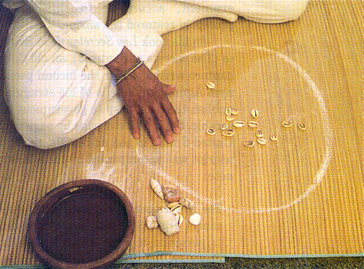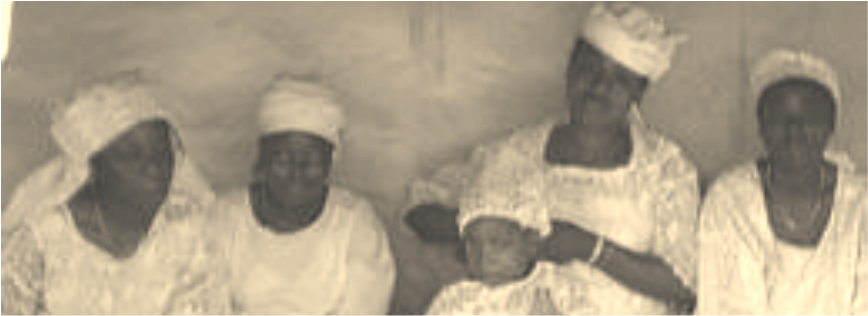Aché and Initiation
When an individual is initiated into the Lucumí religion, the Orichás enter the body through the crown of the head, which explains why the ceremony is sometimes referred to as "crowning." It's also called "asiento" or the seating of the Orichás, because the individual's Orí is strengthened by the presence of the Orichás on the physical head of the initiate. Prior to the initiation process, a ceremony is done to determine which Orichá "owns" the head of the future priest or priestess, and from the moment of initiation, that Orichá works closely with the individual's Orí to bring harmony, balance, and stability to the person's life. The Orichás have more direct access to Olorún's aché, because they are Olorún's children. Their aché is sometimes manifested on earth in the form of rivers, oceans, mountains, wind, volcanos, thunderbolts, plants, trees, or other elements in the natural world. This explains why nature plays such an important role in Santería, and why so many of the ceremonies and rituals involve direct contact with nature. Initiates are sometimes called Omorishas (children of the Orichás) because the initiation process represents rebirth for them. As initiated priests and priestesses, they can work with the aché of the Orichás to remedy many of life's problems.
Concepts of Heaven and Earth

A Consulta with the Dilogún (shells)
Most practitioners of Santería consider life on earth to be more desirable than an permanent existence in the afterlife. While they acknowledge the existence of heaven and its importance in the universe, they prefer to inhabit Ayé, the sphere known as earth. The concept of aché opens the doors to the possibility of reincarnation in the Lucumí religion, because even when the human body dies, aché does not. Aché can be recycled, just as Orí can be, because they aren't confined to the mortal body. Some practitioners believe that we can receive the Orí of an ancestor when we're in the womb of our mothers, and the aché we're given by Olorún when we're born is the same eternal energy that has existed since the beginning of time. The Lucumí religion doesn't share the Christian belief that humans are rewarded for good behavior in the afterlife. The idea that one might live a difficult, painful, and unrewarding life on earth but have eternal glory in Heaven is foreign to practitioners of Santería. Instead, Santeros and Santeras try to have the best life they can have on earth, and to live out their natural life span with the blessings of good health, prosperity, inner peace, and good relationships with others. These blessings come from God and the Orichás, but only with the hard work and correct moral behavior of the human individual. Priests and priestesses of Santería are sometimes called alachés, the custodians of aché, and they are in a sense the bridge between Orún (heaven) and Ayé (earth) when they carry out ceremonies and rituals, songs, drumming and prayers asking for divine intervention. The effectiveness of the ceremonies and prayers depends on the aché of the Santero or Santera who carries them out. Their reward for good moral behavior comes on earth, not in the afterlife, and consists of having a respected position in the religious community and many loyal godchildren who will follow in their footsteps.

